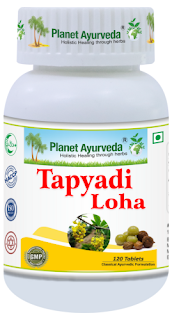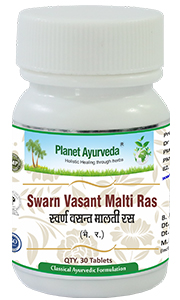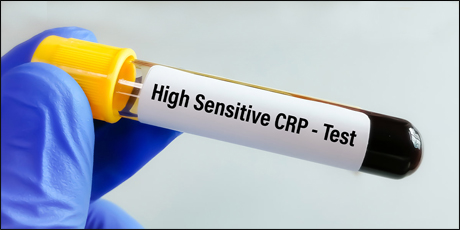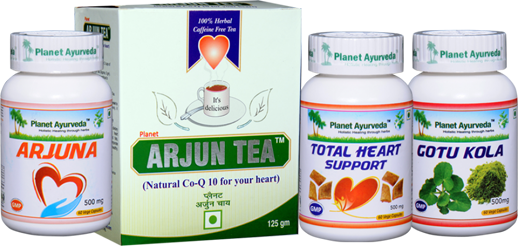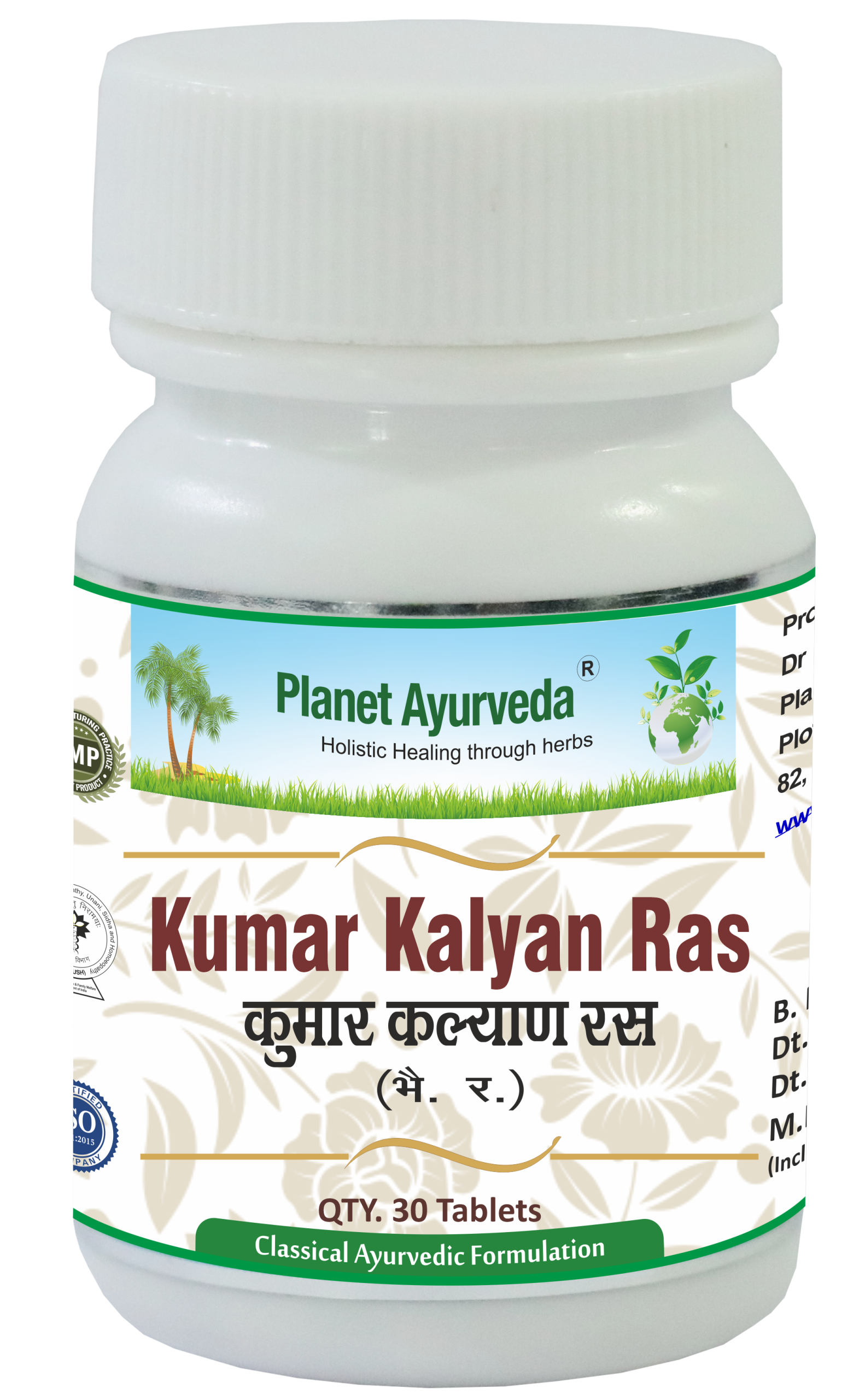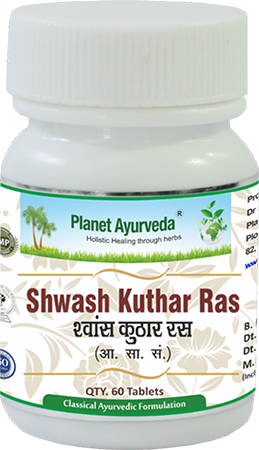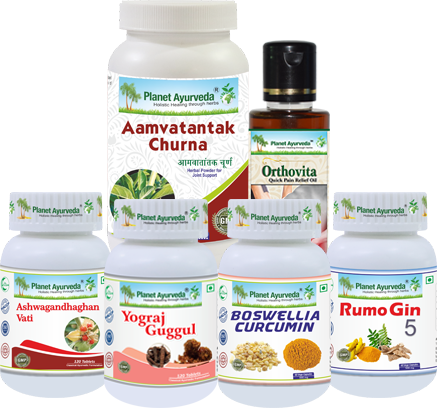Reference : Bhaishajya Ratnavali, Atisaar Rogadhikar, Chapter 7, Verse 158-160
Abstract
Anand Bhairav Ras is a time-tested Ayurvedic herbo-mineral formulation which is used in the treatment of chronic diarrhea (Atisaar), especially those of persistent and complicated origin like Grahani (malabsorption/IBS-like conditions), and Pravahika (dysentery with mucus). In today's context, where chronic diarrhea often stems from impaired digestion, microbial imbalances, and malabsorption, Anand Bhairav Ras acts as an effective Agnideepaka (digestive stimulant), Ama Pachaka (toxin digester), and Grahi (stool binder). Its holistic action on strengthening digestion, reducing excess secretions, and combating underlying factors makes it highly suitable for managing chronic diarrheal conditions.
Introduction
The term "Anand" signifies bliss or happiness, and "Bhairav" embodies a fierce yet protective manifestation of Lord Shiva, symbolizing its potent capacity to eradicate disease. "Ras" indicates a formulation meticulously processed with mercurial ingredients. Therefore, Anand Bhairav Ras is a preparation designed to swiftly and effectively alleviate chronic diarrheal conditions (Atisaar), restore intestinal strength, and shield the body from further deterioration by balancing all three doshas, particularly Kapha and Vata, which are often aggravated in these states.
Classical Indication
Atisaar (Chronic diahorrea)
Ingredients
- Shuddha Hingula – Purified Cinnabar
- Shuddha Vatsanabha – Purified Aconitum ferox
- Shuddha Tankan – Purified Borax
- Maricha – powder of Piper nigrum (Black Pepper)
- Pippali – powder of Piper longum (Long Pepper)
Bhavana Dravya (Trituration Medium): Water
Description Of The Ingredients
1. Shuddha Hingula (Purified Cinnabar)
It has a pungent taste and hot potency, acting as a potent catalyst (Yogavahi) and powerful antimicrobial. It primarily pacifies Kapha and Vata doshas. In chronic diarrhea, it helps to consolidate stools by strengthening the digestive fire and eliminating underlying microbial factors.
2. Shuddha Vatsanabha (Purified Aconitum ferox)
Possessing a pungent taste and extremely hot potency, it is a strong digestive stimulant (Deepana) and metabolic enhancer (Pachana). It vigorously pacifies Kapha and Vata. In chronic diarrhea, it aids in burning ama (toxins), improving digestion, and reducing excessive secretions.
3. Shuddha Tankan (Purified Borax)
It has a salty taste and hot potency, acting as an absorbent and expectorant. It primarily pacifies Kapha dosha. In chronic diarrhea, it helps to dry up excess fluid and reduce intestinal secretions, contributing to stool formation.
4. Maricha (Powder of Piper nigrum - Black Pepper)
It has a pungent taste and hot potency, acting as a powerful digestive stimulant (Deepana) and carminative. It pacifies Kapha and Vata doshas. In chronic diarrhea, it enhances digestive fire, helps in the proper assimilation of food, and reduces flatulence.
5. Pippali (Powder of Piper longum - Long Pepper)
It has a pungent taste and hot potency, acting as a rejuvenative (Rasayana) for the digestive system and a strong stimulant for metabolic processes. It pacifies Kapha and Vata doshas. In chronic diarrhea, it supports digestion, enhances nutrient absorption, and helps to dry up excessive mucosal secretions.
Method Of Preparation
- Mix all powdered ingredients in equal quantities in a clean mortar (Khalwa Yantra).
- Add water in an adequate quantity.
- Triturate well until a fine homogeneous mass is formed.
- Roll into small tablets (Vati) of 125 mg each. Store in a dry, shady, cool place.
Medicinal Properties
- In Atisaar (chronic diarrhea), especially chronic or intractable, with honey and Kutaj twak churan (Holarrhena antidysenterica bark powder) and inderyav churan (powder made from the seeds of Holarrhena antidysenterica) in equal quantity.
- In Grahani (IBS-like conditions and malabsorption), with buttermilk or bilva (Aegle marmelos) pulp.
- In Agnimandya (poor digestion and loss of appetite) associated with chronic diarrhea, with cumin water or Triphala decoction.
- In Pravahika (dysentery-like conditions with mucus), with kutaja bark decoction.
- In Shoola (abdominal pain/cramps) accompanying chronic diarrhea, with warm water and a pinch of rock salt.
- In Jwara (fever) with associated chronic diarrhea, with guduchi (Tinospora cordifolia) swarasa and honey.
- In Ajeerna (indigestion) leading to chronic diarrhea, with hingwashtak churna or warm water.
- In Balashosha (emaciation/wasting) due to chronic diarrhea, with milk and ghee, after the digestive fire improves.
- In cases of severe debility from chronic diarrhea, ashwagandha churna and warm milk.
- In udara shoola (colic pain) with diarrhea, with ajwain (carom seeds) water or a warm compress.
Impact On Dosha
- Balances Vata and Kapha
- Helps to manage Tridoshaj Atisaar (chronic diarrhea)
Indications
- Chronic Diarrhea (Atisaar)
- Malabsorption Syndrome / Irritable Bowel Syndrome-like conditions (Grahani)
- Weak Digestive Fire (Agnimandya)
- Dysentery (Pravahika)
- Fever (Jwara)
- Abdominal Pain / Cramps (Shoola)
- Indigestion (Ajeerna)
Dosage
Adults – 125 mg to 250 mg.
To be taken with: honey, with honey and Kutaj twak churan (Holarrhena antidysenterica bark powder) and inderyav churan (powder made from the seeds of Holarrhena antidysenterica) in equal quantity.
Use under medical supervision.
Pathya (What’s Recommended To Eat During The Use Of This Formulation)
- Curd rice
- Buttermilk, which is made from goat’s milk curd, is mixed with the rice
- Drink water in small quantities when the patient feels more thirsty
Contraindications
- Avoid during pregnancy and lactation
- Use cautiously in children
- Not to be taken without proper detoxification of Vatsanabha
- Always use under an Ayurvedic physician's supervision
Conclusion
Anand Bhairav Ras is a highly effective classical formulation used primarily in managing complex and chronic diarrheal conditions. It not only helps to consolidate stools and reduce frequency but also revitalizes the digestive system, improves nutrient absorption, eliminates Ama (toxins), and enhances overall strength. When used under expert guidance, it serves as a powerful Ayurvedic remedy for chronic diarrhea and associated digestive ailments, proving its continued relevance in contemporary health challenges.

